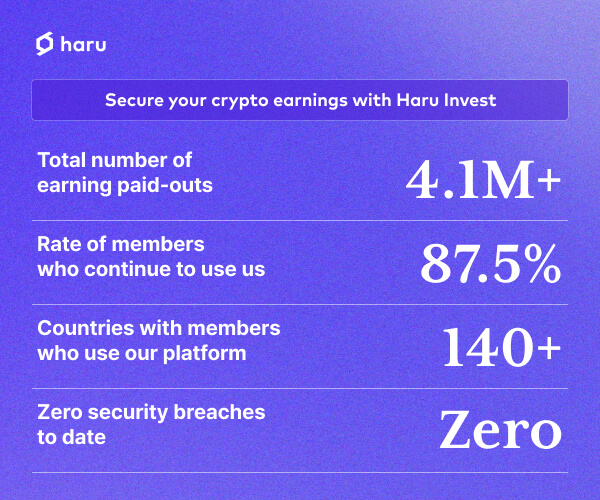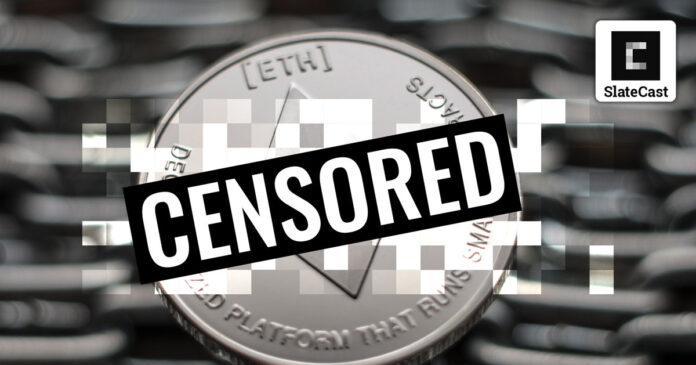
In this episode of the SlateCast, CryptoSlate’s Akiba spoke to Lachlan from Laybrys, the company behind the website mevwatch.info to discuss the issue of censorship on the Ethereum network, specifically in relation to Validators outsourcing their block production to MV boost relays, which have the ability to censor transactions. This has led to a situation where approximately 90% of transactions on the Ethereum network are being censored.
Akiba explains that the censorship is being carried out due to concerns over compliance with OFAC (Office of Foreign Assets Control) sanctions. Validators are using MV boost relays to censor transactions coming from certain countries or involving certain individuals or organizations in order to avoid being in violation of these sanctions and facing fines or other penalties.
The podcast then delves further into the motivations behind the censorship and the impact it is having on the Ethereum network. Lachlan points out that Validators are essentially caught in a catch-22, as they are able to make more money by outsourcing block production to MV boost relays, but if they stop doing so, they risk facing sanctions. They also discuss the fact that Vitalik Buterin, the creator of Ethereum, has been relatively quiet on the issue and the role of the community in addressing it.
The conversation then evolves to discuss the potential consequences of the censorship, including the possibility of more restrictive regulations being put in place and the potential for Ethereum to be completely censored. They also consider the potential for short-term fixes, such as Encrypted Mempools, to be implemented in the interim.
There are ethical implications of the censorship, including the fact that it is effectively giving OFAC control over what happens on the Ethereum network and the potential for legitimate use cases, such as those involving Tornado Cash, to be impacted. The speakers also discuss the role of the community in addressing the issue and the importance of demonstrating to regulators that censorship is not as simple as writing new rules.
There is potential for solutions to be implemented at the protocol level and the importance of reducing the level of censorship on the Ethereum network in the short term. The podcast also emphasizes the need to retain the decentralized nature of Ethereum and to avoid setting a precedent that could allow for further censorship in the future.
Overall, the podcast highlights the complex issue of censorship on the Ethereum network and the potential consequences it could have for the cryptocurrency and its users. It also emphasizes the need for a solution to be implemented as soon as possible in order to protect the decentralized nature of Ethereum and prevent the possibility of further censorship.
To learn more watch the full episode available above now.
Credit: Source link






















 Bitcoin
Bitcoin  Ethereum
Ethereum  Tether
Tether  Solana
Solana  XRP
XRP  Dogecoin
Dogecoin  USDC
USDC  Cardano
Cardano  Lido Staked Ether
Lido Staked Ether  TRON
TRON  Avalanche
Avalanche  Shiba Inu
Shiba Inu  Toncoin
Toncoin  Wrapped stETH
Wrapped stETH  Wrapped Bitcoin
Wrapped Bitcoin  Stellar
Stellar  Polkadot
Polkadot  Chainlink
Chainlink  Bitcoin Cash
Bitcoin Cash  Sui
Sui  WETH
WETH  Pepe
Pepe  LEO Token
LEO Token  Litecoin
Litecoin  NEAR Protocol
NEAR Protocol  Aptos
Aptos  Uniswap
Uniswap  Wrapped eETH
Wrapped eETH  Hedera
Hedera  Internet Computer
Internet Computer  USDS
USDS  Cronos
Cronos  Ethereum Classic
Ethereum Classic  POL (ex-MATIC)
POL (ex-MATIC)  Render
Render  Bittensor
Bittensor  Bonk
Bonk  Ethena USDe
Ethena USDe  WhiteBIT Coin
WhiteBIT Coin  Artificial Superintelligence Alliance
Artificial Superintelligence Alliance  dogwifhat
dogwifhat  MANTRA
MANTRA  Dai
Dai  Arbitrum
Arbitrum  Stacks
Stacks  Filecoin
Filecoin  Cosmos Hub
Cosmos Hub 
